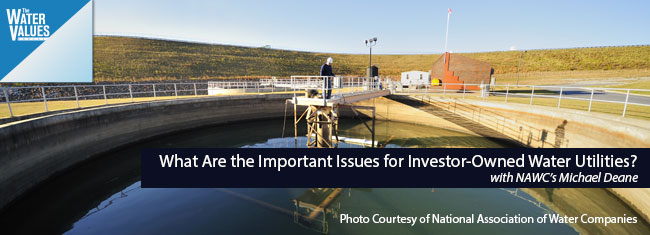Podcast: Play in new window | Download
Subscribe: Apple Podcasts | Android | RSS
Michael Deane, the Executive Director at the National Association of Water Companies, comes on The Water Values Podcast to discuss important issues for investor-owned water utilities. He describes how both the private and public sectors can work together to solve today’s water challenges. With a career dedicated to this vital resource, Michael shares his perspective about how previous generations have paved the way for our nation to enjoy the highest quality water in the world – and now he poses important questions for this generation. This is a conversation not to miss!
In this Session, You’ll Learn about:
- The private side of the water utility business, or investor-owned utilities – and who they serve.
- What role does the NAWC play in addressing water challenges in communities across the U.S.
- What our nation’s water utilities need most, and what is the cost impact for both water service providers and American households.
- What to expect from new economic, public health and environmental regulations - and what role the federal government plays in keeping our water clean and safe.
- What innovation is now asking of the water utility industry.
Resources and Links Mentioned in or Relevant to this Session Include:
- National Association of Water Companies (NAWC)
- United States Environmental Protection Agency
- Safe Drinking Water Act
- Clean Water Act
- National Association of Regulatory Utility Commissioners
- American Water Works Association (AWWA)
- AWWA State of the Water Industry Survey
- Value of Water Coalition
- Clean Water State Revolving Fund
- Water Infrastructure Finance and Innovation Act (WIFIA)
- Transportation Infrastructure Finance and Innovation Act (TIFIA)
- 2014 NAWC Annual Water Summit
- Twitter: @MovinH20Forward
- NAWC’s Facebook page
Transcript
Click here to download the Transcript for Session 24 of The Water Values Podcast.
Thank You!
Thanks to each of you for listening and spreading the word about The Water Values Podcast! Keep the emails coming and please rate and review The Water Values Podcast on iTunes and Stitcher if you haven’t done so already. And don’t forget to tell your friends about the podcast and whatever you do, don’t forget to join The Water Values mailing list!

Pingback: The Water Values Podcast Featuring NAWC’s Executive Director Michael Deane : NAWC
I disagree that “it makes sense” to subsidize water tech. (1) Your analogy with VCRs does not match, since they were NOT subsidized. They developed with competition. Note — important — that Betamax lost to VHS. Subsidies would have interfered with the market. (2) Water utilities provide a “private good” (water to customer who pays), so we know who should pay — the customer, not the taxpayer. (3) Subsidies to ANY tech development is “picking winners” — and bureaucrats are TERRIBLE at that.
Nice to hear Michael, tho 🙂
David – Thanks for your comment. I always look forward to your valuable insights. In this case, however, I think your comments land a bit off target.
First, VCRs were not analogized for purposes of a direct comparison with water tech. The VCR analogy was simply a way to demonstrate that technology costs more when it is young and lowers in price as it matures. Whether the product is subsidized matters not. The important part of the analogy is the technology life-cycle.
Second, in the context of the podcast discussion, Michael compared a subsidy program for existing infrastructure (e.g., replacing a pipe) with a subsidy program for new technology. He indicated he favored the latter, and in my takeaways, I agreed with him. If we’re going to subsidize investment in the water sector, it makes more sense to subsidize projects involving new technology rather than replacing a ductile iron pipe with more ductile iron pipe. Government subsidies aren’t going away, so I think it’s best that they be deployed as efficiently as possible (is that an oxymoron?). Perhaps I should have elaborated on that point to avoid any confusion.
Finally, I don’t think the bureaucrats don’t pick good winners argument (which I agree with) applies here. The utilities seeking subsidized loans are the ones picking the technology. They have a vested interested in choosing the right technology for their application, and that interest would be aligned with that of a utility in the same, except non-subsidized, situation.
As always, David, greatly appreciate your comments!
Thanks,
Dave
Hi Dave
(1) Not all tech falls in cost as matures, if a given tech is bypassed by a better tech. Should companies or gov’t subsidize ALL tech? I think not. Hence my objection and deference to market forces.
(2) I wouldn’t subsidize ANY water infrastructure, since it’s a private good (no reason for gov’t to take taxpayer money when customers can pay). Further, a subsidy for new vs. old pipes misses the possibility that renewal is cheaper/more efficient. Again, a decision best left to local managers
(3) I agree that utilities should pick the best tech, but I disagree that they will succeed in “seeking subsidies” or that those subsidies (which come with strings) are even a good idea.
I can sympathize with Deane representing his members in DC and seeking a piece of the subsidy action, but I disagree that subsidies help industry serve their customers over the biased sources of money.